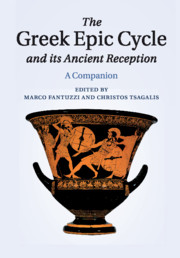Book contents
- Frontmatter
- Contents
- List of illustrations
- List of contributors
- Editorial note
- Introduction: Kyklos, the Epic Cycle and Cyclic poetry
- PART I APPROACHES TO THE EPIC CYCLE
- PART II EPICS
- PART III THE FORTUNE OF THE EPIC CYCLE IN THE ANCIENT WORLD
- 22 The aesthetics of sequentiality and its discontents
- 23 The Epic Cycle, Stesichorus, and Ibycus
- 24 Pindar's Cycle
- 25 Tragedy and the Epic Cycle
- 26 The Hellenistic reception of the Epic Cycle
- 27 Running rings round Troy: Recycling the ‘Epic Circle’ in Hellenistic and Roman art
- 28 Virgil and the Epic Cycle
- 29 Ovid and the Epic Cycle
- 30 Statius' Achilleid and the Cypria
- 31 The Epic Cycle and the ancient novel
- 32 The Epic Cycle and imperial Greek epic
- Works cited
- Index of principal passages
- Index nominum et rerum
26 - The Hellenistic reception of the Epic Cycle
from PART III - THE FORTUNE OF THE EPIC CYCLE IN THE ANCIENT WORLD
Published online by Cambridge University Press: 05 August 2015
- Frontmatter
- Contents
- List of illustrations
- List of contributors
- Editorial note
- Introduction: Kyklos, the Epic Cycle and Cyclic poetry
- PART I APPROACHES TO THE EPIC CYCLE
- PART II EPICS
- PART III THE FORTUNE OF THE EPIC CYCLE IN THE ANCIENT WORLD
- 22 The aesthetics of sequentiality and its discontents
- 23 The Epic Cycle, Stesichorus, and Ibycus
- 24 Pindar's Cycle
- 25 Tragedy and the Epic Cycle
- 26 The Hellenistic reception of the Epic Cycle
- 27 Running rings round Troy: Recycling the ‘Epic Circle’ in Hellenistic and Roman art
- 28 Virgil and the Epic Cycle
- 29 Ovid and the Epic Cycle
- 30 Statius' Achilleid and the Cypria
- 31 The Epic Cycle and the ancient novel
- 32 The Epic Cycle and imperial Greek epic
- Works cited
- Index of principal passages
- Index nominum et rerum
Summary
Contrary to the ringing declaration of Callimachus ἐχθαίρω τὸ ποίημα τὸ κυκλικόν, the Epic Cycle seems to hold a strong attraction for Hellenistic poets.1 As expected, the Homeric myth with its Panhellenic flair is bypassed by those who follow the untrodden paths of arcane mythology and its tellings; in this respect, the ‘invention’ of mythography may be seen as a by-product of the Hellenistic penchant for obscure and original versions of the Greek myths.2 So, apart from the Theseids and the Heracleids, the Pre-Hellenic mythological traditions, the stories of gods and heroes or the local traditions of Attica and Argos, of Greece and the Mediterranean, the narrations deriving from the Epic Cycle – which, according to Proclus (Chrest. apud Phot. Bibl. 319a21 = Cycli epitoma Procli PEG T 13 = T 1 D.), begins with the union of Ouranos and Gaia, and ends with the unwanted killing of Odysseus by his son Telegonus – are of utmost importance for the making of Hellenistic poetry. To support this argument, I shall first give an outline of the reception of the Epic Cycle by mostly referring to Hellenistic poets and poems; in the second part of this study, I shall focus on the devices by which the Hellenistic poets have transformed the Cyclic myths into neoteric material.
The Epic Cycle in Hellenistic poetry: a rough outline
To give an overview of the Hellenistic reception of the Epic Cycle is a daunting task, and not primarily due to the philological problems associated with the textual tradition and the exact plots of these, lost long ago, epics. The temporal and geographical distance separating the various poets, the differences in their aesthetics and style, and the fragmentary preservation of a good part of Hellenistic poetry place many obstacles in the way of scholars trying to address complex questions, such as: which myths and which poems of the Epic Cycle attracted the attention of Hellenistic poets? Did they show a preference for Trojan myth as opposed to other mythic cycles and/or the Homeric myth? How are the Cyclic episodes, motifs or characters reworked under the influence of new genres and narrative forms developed during Hellenistic times?
- Type
- Chapter
- Information
- The Greek Epic Cycle and its Ancient ReceptionA Companion, pp. 487 - 495Publisher: Cambridge University PressPrint publication year: 2015



